Timothy Taylor - Banking's loss is CanLit's gain
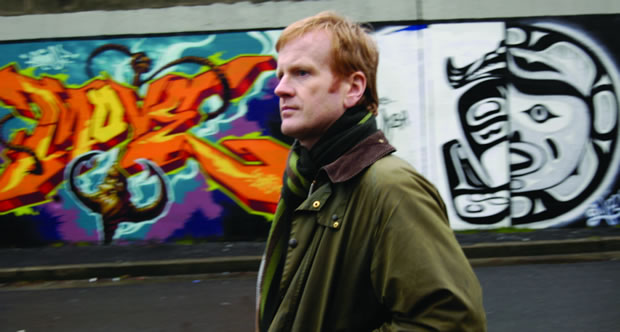
Like many commuters in Vancouver, Timothy Taylor, MBA ’87, fights the cross-town traffic to head to his downtown office most week-day mornings. He’s been making this trip since 1995, toiling at his computer before returning to leafy Point Grey, where he lives with his wife Jane and their four-year-old son Brendan.
What sets him apart is that his only office-mate is a chocolate lab named Buster and the work he’s consumed by is the writing of novels, non-fiction magazine pieces and screenplays.
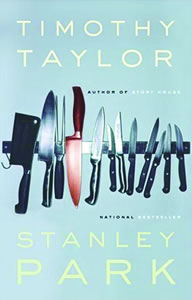 Giller Prize nominated novel by Timothy Taylor Does he really need his own office? “It helps me get into work brain,” he says, conceding that he’s “somewhat business-like” in his approach to writing. Timothy is the acclaimed author of Giller-Prize-nominated novel Stanley Park and two other well-regarded books. He regularly writes travel, humour, arts and business articles for magazines and has won three National Magazine Awards in the process. He says journalism generates new ideas for his fiction and keeps him engaged with the outside world. He also writes documentaries and penned the screenplay for Stanley Park, which is under option to be made into a film.
Giller Prize nominated novel by Timothy Taylor Does he really need his own office? “It helps me get into work brain,” he says, conceding that he’s “somewhat business-like” in his approach to writing. Timothy is the acclaimed author of Giller-Prize-nominated novel Stanley Park and two other well-regarded books. He regularly writes travel, humour, arts and business articles for magazines and has won three National Magazine Awards in the process. He says journalism generates new ideas for his fiction and keeps him engaged with the outside world. He also writes documentaries and penned the screenplay for Stanley Park, which is under option to be made into a film.
It’s hardly a typical career choice for an MBA grad who started his professional life as a banker. Sometimes, it takes a while to find one’s true vocation.
After completing a BA in Economics at the University of Alberta, Timothy decided to do his MBA at Queen’s and planned to work in the booming finance sector in Toronto. Looking back, he sees hints he was being drawn toward another path. “My desk at home was stacked with books by Martin and Kingsley Amis and Mordecai Richler, which was a source of amusement to my room-mate. I think he wondered why I wasn’t reading a finance textbook.”
I Don't Think I Could Have Been A writer If I Hadn't Started Out In A Business Career.
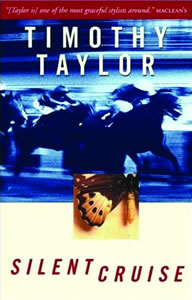 Upon graduation, Timothy was offered a job at TD Bank in Toronto, the place to be in 1987. “It was the epicentre, and I amazed them by saying I’d like to go to sleepy Vancouver. They were happy because it was hard to get people to go there. Looking back, I chose the job for wonky reasons. I guess I was already steering away from what a finance careerist would have done, even back then,” he says.
Upon graduation, Timothy was offered a job at TD Bank in Toronto, the place to be in 1987. “It was the epicentre, and I amazed them by saying I’d like to go to sleepy Vancouver. They were happy because it was hard to get people to go there. Looking back, I chose the job for wonky reasons. I guess I was already steering away from what a finance careerist would have done, even back then,” he says.
For the next four years, Timothy worked in commercial banking at TD. “Then I knew there was something else I wanted to try, and it took a long time to figure out what that was. I came to the conclusion that I wanted to write.”
He took the plunge and left the bank in 1992, tried his hand at journalism, and soon started a small fisheries consulting practice to make ends meet. This part-time work allowed him to start writing seriously and provided needed financial stability as he established his new career.
“I could never have started my own consulting practice if not for the MBA credentials,” Timothy says. “Studying business saved my life. I don’t think I could have been a writer if I hadn’t started out in a business career. It’s very difficult to support yourself at first if you don’t have another way to pay the bills.”
He began to write full-time when Stanley Park was published in 2001.While Timothy was “always the kid with a shoebox full of papers” and for years kept a journal and travel notes, he never took a writing course. He learned to write by studying authors he admires, such as renowned short story author Mavis Gallant, LLD’91. “I’ve always been very aware of what I liked and didn’t like, and if something had a special energy, I took the time to look at it. To try to understand how it works. By being a reader, you develop your own style.”
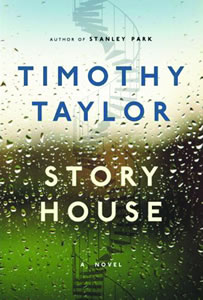 He wrote short stories for the first five years, earning “a massive number of rejections, but that’s how you do it.” Timothy remembers one such rejection in particular.
He wrote short stories for the first five years, earning “a massive number of rejections, but that’s how you do it.” Timothy remembers one such rejection in particular.
“It was comical and might even be considered insulting,” he recalls. “The story was about a woman who goes to Ireland to buy a cheese factory. The rejection letter from the editors said: ‘We found the characters somewhat less interesting than the cheese.’ Then I noticed the word “somewhat” had been scribbled over. What the editor had originally written was: ’We found the characters far less interesting than the cheese.’”
Vindication came in 2000, when he won the Journey Prize for short fiction and became the first writer ever to have three stories (including the aforementioned cheese factory story) published in a single edition of the Journey Prize Anthology. “I was shocked; up until then I’d never read any public comments on my work,” he recalls.
Shortly afterward, his first novel, Stanley Park, was published to outstanding reviews. “Up until that point, I’d never even met a writer.” Then the book was nominated for the Giller Prize. “Diane Martin, my editor at Knopf, called and said, ‘Guess what? Today the Giller shortlist was announced. You’re on it.’” He pauses. “I had to pull the car over – I was taking my wife to work
– and started having heart palpitations.”
The book garnered much praise and more awards (though not the Giller) and helped solidify his reputation. Since then, he has written two other well-received books: Silent Cruise, a collection of short fiction published in 2002, and the novel Story House in 2006.
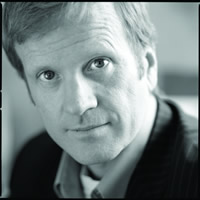 Timothy Taylor, MBA ’87Timothy has just finished his fourth book, The Blue Light Project. “It’s about three days in the life of a city that’s gripped by a hostage taking at a television studio in the centre of town. The story follows three characters who orbit these events, and it tracks how they are changed by it. It’s more suspenseful than anything I’ve written in the past,” he says.
Timothy Taylor, MBA ’87Timothy has just finished his fourth book, The Blue Light Project. “It’s about three days in the life of a city that’s gripped by a hostage taking at a television studio in the centre of town. The story follows three characters who orbit these events, and it tracks how they are changed by it. It’s more suspenseful than anything I’ve written in the past,” he says.
The novel should hit the stores in 18 to 24 months. For now, those flying on Air Canada can read his “Cranky Connoisseur” columns in upcoming issues of the airline’s enRoute magazine.
The rewards of a writing career have been great and include such highlights as meeting Mavis Gallant while working on a documentary film about her. “She told me she had read Silent Cruise. I would never have guessed she’d have the interest to do this. She said, ‘I read your book and it’s wonderful and original and you know what you’re doing.’ It was fantastic.”
Does Timothy have any advice for any aspiring authors who find his jump from banking to writing inspirational?
“I think you really have to ask yourself if you’re compelled to do it. Do you have a story that you feel you must tell? Many people have such a story.”
So what sets apart the people who dream of writing from those who actually do it? “The romance of writing fades,” he says. “It requires long hours of solitude. And one thing I’ve discovered I can do is sit in front of a computer for many hours by myself. It’s not all that’s required, clearly, but it’s definitely part of the reality of writing.”
Maybe some of that discipline acquired during his MBA studies and banking career came in handy after all.
